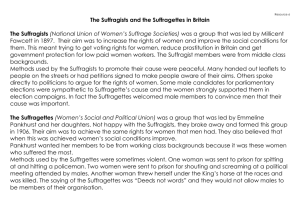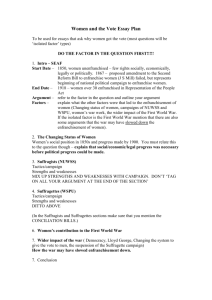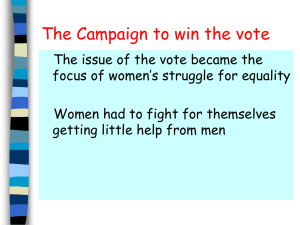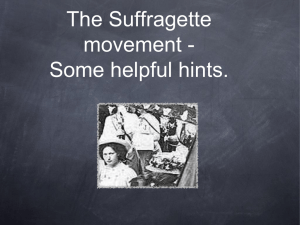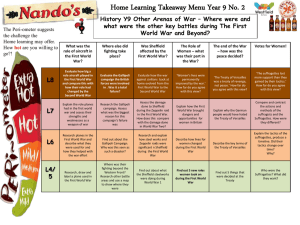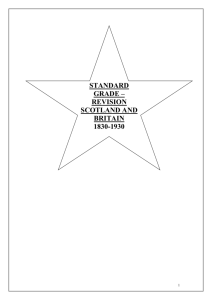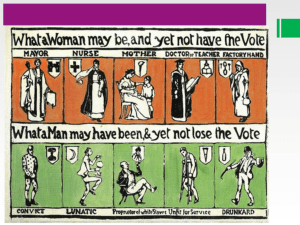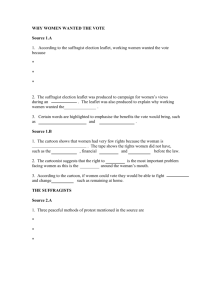The Nazis Party in the 1920s
advertisement
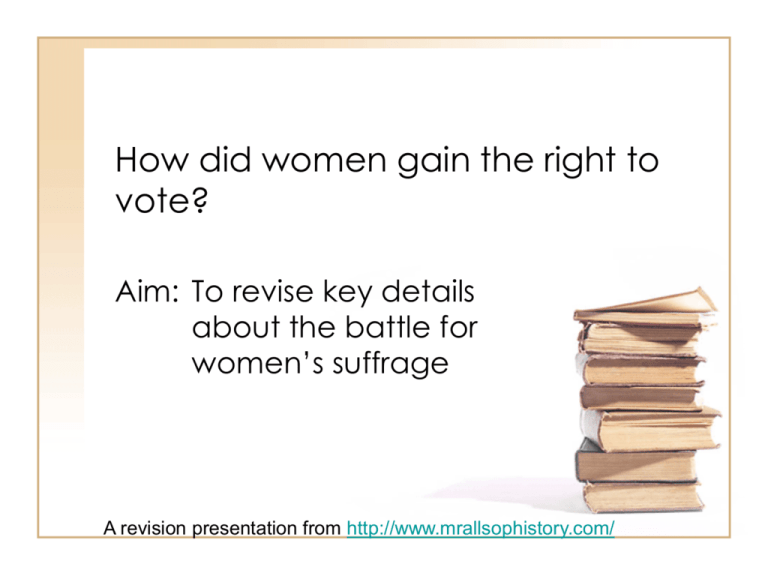
How did women gain the right to vote? Aim: To revise key details about the battle for women’s suffrage A revision presentation from http://www.mrallsophistory.com/ Votes for women? Arguments For Arguments Against Women’s Campaign Groups • Over the next few pages are statements about the two different women’s campaign groups. • See if you can remember whether the statement describes the suffragettes or the suffragists. Women’s Campaign Groups A. The Suffragists B. The Suffragettes Also called the NUWSS (National Union of Women’s Suffrage Societies) Women’s Campaign Groups A. The Suffragists B. The Suffragettes Also called the WSPU (Women’s Social and Political Union) Women’s Campaign Groups A. The Suffragists B. The Suffragettes Led by Mrs Emmeline Pankhurst Women’s Campaign Groups A. The Suffragists B. The Suffragettes Led by Mrs Millicent Fawcett Women’s Campaign Groups A. The Suffragists B. The Suffragettes Used peaceful campaigning Women’s Campaign Groups A. The Suffragists B. The Suffragettes Used radical and militant methods The Suffragettes Click here to watch the clip on YouTube Reactions to the Suffragettes • The next slide shows a cartoon drawn in reaction to the suffragettes. • What does it show • What does it suggest about the artist’s opinion of suffragettes? • Who do you think drew it? • Why? Reactions to the Suffragettes 1911 Conciliation Bill • The government promised to “conciliate” (make peace) by introducing votes for women • It got an enormous majority… • …but was then dropped! Suffragist response A. Try to persuade the Prime Minister to change his mind B. Support the Labour Party at the new election C. Organise a march from Carlisle to London D. Offer free membership to all women E. All of the above Suffragette response A. Escalated their campaign of violence B. Escalated their campaign of violence C. Escalated their campaign of violence D. Escalated their campaign of violence E. All of the above Suffragette response s Drawing of a force-feeding published in the Suffragette magazine, 1909 • The Temporary Discharge of Prisoner’s Act (1913) • This meant that prisoners who were weak from hunger striking could be released from prison • When they were stronger, they were re-arrested and brought back to prison to finish their sentence Emily Davison • Wanted to publicise the suffragettes • Tried to pin a flag on the King’s horse at the Derby at Epsom racecourse • She was killed in the collision Emily Davison A. An extreme protest to martyr herself for the suffragettes? B. A publicity stunt that went terribly wrong? How effective were the suffragettes? • They had raised the public profile of the issue • The government only started taking the issue seriously after militancy started • Increasing violence reduced support • Supported the view that women were irrational • If the government gave in violence here, what other violence might happen – Would Ireland mount violent protests for Home Rule? How effective were the suffragettes? • Vote on a scale of 1-10 Women in WW1 • When war broke out, both suffragettes and suffragists suspended their campaigns for the vote • They began actively trying to recruit men for the army – white feather, etc. • As more and more men went to war, industry began to suffer a shortage of workers Women in WW1 • In which order did women enter “men’s” jobs? A. Munitions factories B. Women’s Army Auxiliary Corps C. Women’s Land Army D. Office jobs Women in WW1 • In which order did women enter “men’s” jobs? D. Office jobs A. Munitions factories C. Women’s Land Army B. Women’s Army Auxiliary Corps Women in WW1 • Women began working in offices • Industry was reluctant at first to take on women – Did they have the skills? – Unions feared that women would be cheaper, and so men would be too expensive when they returned Women in WW1 • By 1916, the number of industrial workers was desperate – More and more munitions and supplies needed at the front – Less and less men working in factories, because they’d all joined the army Women in WW1 • Women began working in munitions factories • By the end of the war almost 800,000 women were working in them – They proved they were just as skilled and capable as men Women in WW1 • As the war went on, more women started to work in “men’s” jobs • Bus conductors, postal workers, etc. • Women’s Land Army • A kind of social revolution was taking place (Some) women get the vote… • In 1918 the Representation of the People Act was passed • Older and/or richer women were given the vote • Younger, working-class women may still have been too “radical” • All women got the vote in 1928
